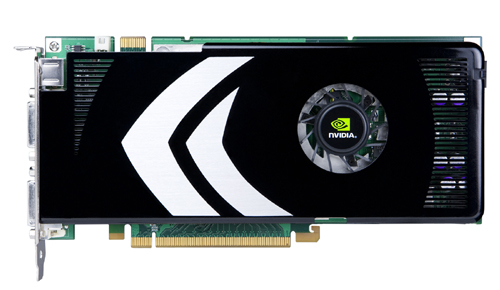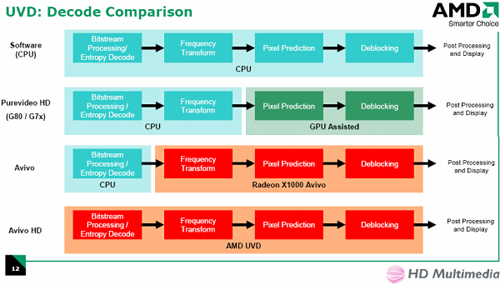NVIDIA GeForce 8800 GT: The Only Card That Matters
by Derek Wilson on October 29, 2007 9:00 AM EST- Posted in
- GPUs
The Card
The GeForce 8800 GT, whose heart is a G92 GPU, is quite a sleek card. The heatsink shroud covers the entire length of the card so that no capacitors are exposed. The card's thermal envelop is low enough, thanks to the 65nm G92, to require only a single slot cooling solution. Here's a look at the card itself:

The card makes use of two dual-link DVI outputs and a third output for analog HD and other applications. We see a single SLI connector on top of the card, and a single 6-pin PCIe power connector on the back of the card. NVIDIA reports the maximum dissipated power as 105W, which falls within the 150W power envelope provided by the combination of one PCIe power connector and the PCIe x16 slot itself.
The fact that this thing is 65nm has given rise to at least one vendor attempting to build an 8800 GT with a passive cooler. While the 8800 GT does use less power than other cards in its class, we will have to wait and see if passive cooling will remain stable even through the most rigorous tests we can put it through.
Earlier this summer we reviewed NVIDIA's VP2 hardware in the form of the 8600 GTS. The 8800 GTX and GTS both lacked the faster video decode hardware of the lower end 8 Series hardware, but the 8800 GT changes all that. We now have a very fast GPU that includes full H.246 offload capability. Most of the VC-1 pipeline is also offloaded by the GPU, but the entropy encoding used in VC-1 is not hardware accelerated by NVIDIA hardware. This is less important in VC-1, as the decode process is much less strenuous. To recap the pipeline, here is a comparison of different video decode hardware:

NVIDIA's VP2 hardware matches the bottom line for H.264, and the line above for VC-1 and MPEG-2. This includes the 8800 GT.
We aren't including any new tests here, as we can expect performance on the same level as the 8600 GTS. This means a score of 100 under HD HQV, and very low CPU utilization even on lower end dual core processors.
Let's take a look at how this card stacks up against the rest of the lineup:
On paper, the 8800 GT completely gets rid of the point of the 8800 GTS. The 8800 GT has more shader processing power, can address and filter more textures per clock, and only falls short in the number of pixels it can write out to memory per clock and overall memory bandwidth. Even then, the memory bandwidth advantage of the 8800 GTS isn't that great (64GB/s vs. 57.6GB/s), amounting to only 11% thanks to the 8800 GT's slightly higher memory clock. If the 8800 GT does end up performing the same, if not better, than the 8800 GTS then NVIDIA will have truly thrown down an amazing hand.
You see, the GeForce 8800 GTS 640MB was an incredible performer upon its release, but it was still priced too high for the mainstream. NVIDIA turned up the heat with a 320MB version, which you'll remember performed virtually identically to the 640MB while bringing the price down to $300. With the 320MB GTS, NVIDIA gave us the performance of its $400 card for $300, and now with the 8800 GT, NVIDIA looks like it's going to give us that same performance for $200. And all this without a significant threat from AMD.
Before we get too far ahead of ourselves, we'll need to see how the 8800 GT and 8800 GTS 320MB really do stack up. On paper the decision is clear, but we need some numbers to be sure. And we can't get to the numbers until we cover a couple more bases The only other physical point of interest about the 8800 GT is the fact that it takes advantage of the PCIe 2.0 specification. Let's take a look at what that really means right now.
The GeForce 8800 GT, whose heart is a G92 GPU, is quite a sleek card. The heatsink shroud covers the entire length of the card so that no capacitors are exposed. The card's thermal envelop is low enough, thanks to the 65nm G92, to require only a single slot cooling solution. Here's a look at the card itself:

The card makes use of two dual-link DVI outputs and a third output for analog HD and other applications. We see a single SLI connector on top of the card, and a single 6-pin PCIe power connector on the back of the card. NVIDIA reports the maximum dissipated power as 105W, which falls within the 150W power envelope provided by the combination of one PCIe power connector and the PCIe x16 slot itself.
The fact that this thing is 65nm has given rise to at least one vendor attempting to build an 8800 GT with a passive cooler. While the 8800 GT does use less power than other cards in its class, we will have to wait and see if passive cooling will remain stable even through the most rigorous tests we can put it through.
Earlier this summer we reviewed NVIDIA's VP2 hardware in the form of the 8600 GTS. The 8800 GTX and GTS both lacked the faster video decode hardware of the lower end 8 Series hardware, but the 8800 GT changes all that. We now have a very fast GPU that includes full H.246 offload capability. Most of the VC-1 pipeline is also offloaded by the GPU, but the entropy encoding used in VC-1 is not hardware accelerated by NVIDIA hardware. This is less important in VC-1, as the decode process is much less strenuous. To recap the pipeline, here is a comparison of different video decode hardware:

NVIDIA's VP2 hardware matches the bottom line for H.264, and the line above for VC-1 and MPEG-2. This includes the 8800 GT.
We aren't including any new tests here, as we can expect performance on the same level as the 8600 GTS. This means a score of 100 under HD HQV, and very low CPU utilization even on lower end dual core processors.
Let's take a look at how this card stacks up against the rest of the lineup:
| Form Factor | 8800 GTX | 8800 GTS | 8800 GT | 8600 GTS |
| Stream Processors | 128 | 96 | 112 | 32 |
| Texture Address / Filtering | 32 / 64 | 24 / 48 | 56 / 56 | 16 / 16 |
| ROPs | 24 | 20 | 16 | 8 |
| Core Clock | 575MHz | 500MHz | 600MHz | 675MHz |
| Shader Clock | 1.35GHz | 1.2GHz | 1.5GHz | 1.45GHz |
| Memory Clock | 1.8GHz | 1.6GHz | 1.8GHz | 2.0GHz |
| Memory Bus Width | 384-bit | 320-bit | 256-bit | 128-bit |
| Frame Buffer | 768MB | 640MB / 320MB | 512MB / 256MB | 256MB |
| Transistor Count | 681M | 681M | 754M | 289M |
| Manufacturing Process | TSMC 90nm | TSMC 90nm | TSMC 65nm | TSMC 80nm |
| Price Point | $500 - $600 | $270 - $450 | $199 - $249 | $140 - $199 |
On paper, the 8800 GT completely gets rid of the point of the 8800 GTS. The 8800 GT has more shader processing power, can address and filter more textures per clock, and only falls short in the number of pixels it can write out to memory per clock and overall memory bandwidth. Even then, the memory bandwidth advantage of the 8800 GTS isn't that great (64GB/s vs. 57.6GB/s), amounting to only 11% thanks to the 8800 GT's slightly higher memory clock. If the 8800 GT does end up performing the same, if not better, than the 8800 GTS then NVIDIA will have truly thrown down an amazing hand.
You see, the GeForce 8800 GTS 640MB was an incredible performer upon its release, but it was still priced too high for the mainstream. NVIDIA turned up the heat with a 320MB version, which you'll remember performed virtually identically to the 640MB while bringing the price down to $300. With the 320MB GTS, NVIDIA gave us the performance of its $400 card for $300, and now with the 8800 GT, NVIDIA looks like it's going to give us that same performance for $200. And all this without a significant threat from AMD.
Before we get too far ahead of ourselves, we'll need to see how the 8800 GT and 8800 GTS 320MB really do stack up. On paper the decision is clear, but we need some numbers to be sure. And we can't get to the numbers until we cover a couple more bases The only other physical point of interest about the 8800 GT is the fact that it takes advantage of the PCIe 2.0 specification. Let's take a look at what that really means right now.










90 Comments
View All Comments
Spacecomber - Monday, October 29, 2007 - link
TestEateryOfPiza - Monday, October 29, 2007 - link
What kind of G92 variants can we expect by Christmas 07?Or Summer 08?
mpc7488 - Monday, October 29, 2007 - link
ardOCP is reporting that nVidia is increasing the 8800GTS stream processors to 112.Spacecomber - Monday, October 29, 2007 - link
Testing ;-)Spacecomber - Monday, October 29, 2007 - link
It appears that it was the bracketed h that was hiding all subsequent text. It needed a bracketed /h to close that "feature".mpc7488 - Monday, October 29, 2007 - link
Haha - thanks. I guess if anyone wants the explanation of the stream processors they can highlight the 'hidden message'.mpc7488 - Monday, October 29, 2007 - link
I'm not sure why the first post lost my text unless it was the bracket I used around the H - but HardOCP is reporting that nVidia is changing the 8800GTS 640 MB to have 112 stream processors.mpc7488 - Monday, October 29, 2007 - link
Great article Derek - I think you can tell you're mildly excited about this product :)Is there a reason that you didn't do any tests with anti-aliasing? I would assume that this would show more deviation between the 8800GTX and the 8800GT?
chizow - Monday, October 29, 2007 - link
Nice job as usual Derek!Just wondering though, if you were able to test the cards at the same clock speeds. The GT by default has @100MHz advantage on the core over the GTS, which is a common reason the GTS falls so far behind in head to head testing. I expect the GT to have more OC'ing headroom than the GTS anyways, but it would be nice to see an apples to apples comparison to reveal the impact of some of the architecture changes from G80 to G92. Of note, the GT has fewer ROPs and a smaller memory bus but gains 1:1 address/filter units and 16 more stream processors.
Also, I saw an early review that showed massive performance gains when the shader processor was overclocked on the GT; much bigger gains than significant increases to the core/memory clocks. Similar testing with the GTS/GTX don't yield anywhere near that much performance gain when the shader core clock is bumped up.
Lastly, any idea when the G92 8800GTS refresh is going to be released? With a 640MB GTS this seems more of a lateral move to an 8800GT, although a refreshed GTS with 128SP and all the other enhancements of the G92 should undoubtedly be faster than the GTX...and maybe even the Ultra once overclocked.
Hulk - Monday, October 29, 2007 - link
I'm looking to build a HTPC and this would be a great card if it does video decoding?